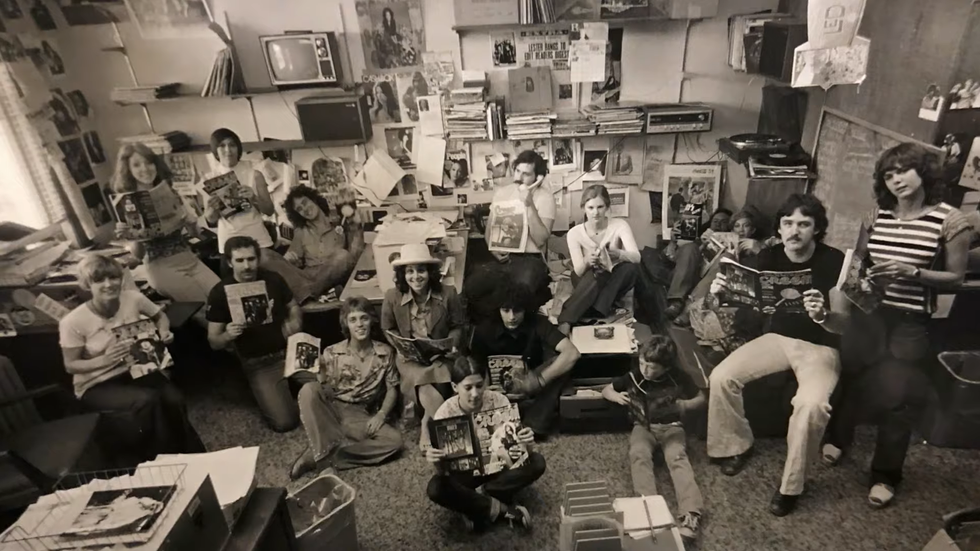When you think of music journalism, you probably have at least a few names that come to mind relatively quickly; Rolling Stone, XXL, maybe Pitchfork? But in the context of rock history, the name CREEM probably means more to you as the legendary power trio, Cream, versus a prominent counterculture outlet.
In its two-decade-long heyday from 1969 to 1989, CREEM wasn't just one of the key outlets in music journalism; to some, it was THE outlet. Publisher Barry Kramer and his team gave names and notoriety to everyone from Michigan punks like The Stooges to new wave pioneers like Roxy Music, all with a brand of fearless humor and love for the craft that found a pretty substantial audience.
While a lot of the mainstream legacy of the magazine has since depleted, there are still a fair amount of those in the music industry who treat the name CREEM (and the iconic "Boy Howdy" mascot) with a lot of reverence. That kind of legacy and approach gets explored in the new documentary, 'CREEM: America's Only Rock n' Roll Magazine' and has a pretty substantial team to try and tell the story.
Director Scott Crawford is more than qualified to take on this kind of subject matter (his last documentary, 'Salad Days' explored the 1970s punk scene in Washington D.C) and the producing credits include CREEM alumni like Jaan Uhelszki and JJ Kramer. Plus the magazine's reputation has traveled far enough for interviews with everyone from Joan Jett and Chad Smith to director Cameron Crowe (who actually immortalizes some of the magazine's legacy in 2000's 'Almost Famous')
So, what kind of context does 'CREEM: America's Only Rock n' Roll Magazine' provide for this part of history? Well, for the most part, exactly what it needs to. Scott Crawford's documentary is as wild and eccentric as the legends of its source material, with some well-paced history and substantial respect for that era of music journalism, even if it can sometimes feel a bit surface-level and romanticized for its own good.
In 1969, Barry Kramer worked at a records store in Detroit when he was approached by a fellow store clerk named Tony Reay to start a rock music magazine. Naming the magazine CREEM (a misspelling of the British rock trio), Kramer began to assemble a team of writers that would bring "authentic, fan-focused music journalism" to the masses and would offer Detroit as an alternative to the cultural hubs of Los Angeles and New York.
That team would ultimately include writers like Dave Marsh, Lester Bangs, Susan Whitall, Robert Christgau, and even Patti Smith (yup…THAT Patti Smith). The film attempts to explore the often tumultuous relationships of the staff (particularly between Kramer, Marsh, and Bangs), the approaches that the magazine would take in pushing new underground artists and genres, and, ultimately, what made CREEM such an icon for a generation of musicians.
The documentary really rests on the idea of CREEM as a magazine being built on shared fun and, in that sense, the film actually really works. For all of the messy attitudes that seem to be put forth by the story, the various interviewees and stories give this great sense of comradery to it; that everyone who worked at CREEM didn't just want a successful magazine, but also legitimate success and respect for the artists that they put forth.
I especially like the contrasts the film gives between CREEM and Rolling Stone, especially because it doesn't save the former from seeming slightly pretentious in its own right and doesn't necessarily vilify the latter. Rolling Stone always went broader, trying to keep an ear to how everything in art and culture connected with the larger society, whereas CREEM's approach was far more intimate and had to rely on a lot more grassroots word of mouth to even get into those larger conversations.
*And that's coming from a Rolling Stone subscriber, so take my opinion for whatever that's worth.
But it's the stories of the CREEM alumni that are its biggest selling point, mostly those between that core trio of Kramer, Marsh and Bangs. While there's only so much the film can process (both Kramer and Bangs passed away), there is this great idea of business v. idealism and the degrees to which those three would lean towards. There's a distinctly interesting conversation throughout the film about where a "music magazine" should lean towards; how much reverence should be given to artists (if at all), how much emphasis should be put on those larger socio-political issues in contrast to the music, etc.
That said, I still wouldn't give this documentary a full-blown pass, mostly because it can feel a bit too self-praising at times. To be fair, it does deserve some of that; many of the most prominent writers were pioneers for an entire generation of music journalists, especially Bangs. However, I would argue that there seems to be too much care in framing CREEM's reputation as the epicenter of coolness when so much of the film revolves around not being taken too seriously (although that could very well just be more based in the excessive celebrity interviews, not so much the documentary itself.)
There's also the element of discussing CREEM's representation in its content which can feel fair, but also messily framed. Yes, it is cool to hear about a prominent, credible cultural outlet where women are given significant spaces in their workplace and allowed to voice their stories in said workplace. But it also makes clear that those spaces were often fraught with outdated tendencies and the film doesn't really want to confront those larger questions aside from "it was the 70s, those things happen."
Even in its content alone, there are some great stories early on about the larger Detroit music community that sparked CREEM; how black soul musicians and white punk bands would have their audiences support their shows and records. It's a topic that the documentary just winds up avoiding entirely and can make that legacy of cool feel a bit incomplete (and the film is paced so well, you could have added 10-15 more minutes to cover these and it probably wouldn't have dragged).
Regardless, I was still happy getting what we got. CREEM magazine is owed a very distinct and beloved spot in music journalism history and 'CREEM: America's Only Rock n' Roll Magazine' does a good job of framing why. Barry Kramer had a very distinct vision, pulled together incredibly unique writers, and put together a magazine that wound up putting a lot of really important voices into the music lexicon for decades to come.
It certainly doesn't feel complete at times and it can feel a bit too self-aggrandizing, but it's also kind of earned that opportunity to boast, especially when you see just how much of the music world in the coming decades would take to the acts and sensibilities that CREEM made cool. It's a great piece of music history told by people who lived their lives by it, all with a pretty fantastic soundtrack to tie it all together.
Overall, I give 'CREEM: America's Only Rock 'n' Roll Magazine' 7.5/10.
____________________________________________
Want to follow me on social media? Follow me on Twitter and IG @TheMovieKing45





 Going to the cinema alone is good for your mental health, says science
Going to the cinema alone is good for your mental health, says science












 women in street dancing
Photo by
women in street dancing
Photo by  man and woman standing in front of louver door
Photo by
man and woman standing in front of louver door
Photo by  man in black t-shirt holding coca cola bottle
Photo by
man in black t-shirt holding coca cola bottle
Photo by  red and white coca cola signage
Photo by
red and white coca cola signage
Photo by  man holding luggage photo
Photo by
man holding luggage photo
Photo by  topless boy in blue denim jeans riding red bicycle during daytime
Photo by
topless boy in blue denim jeans riding red bicycle during daytime
Photo by  trust spelled with wooden letter blocks on a table
Photo by
trust spelled with wooden letter blocks on a table
Photo by  Everyone is Welcome signage
Photo by
Everyone is Welcome signage
Photo by  man with cap and background with red and pink wall l
Photo by
man with cap and background with red and pink wall l
Photo by  difficult roads lead to beautiful destinations desk decor
Photo by
difficult roads lead to beautiful destinations desk decor
Photo by  photography of woman pointing her finger near an man
Photo by
photography of woman pointing her finger near an man
Photo by  closeup photography of woman smiling
Photo by
closeup photography of woman smiling
Photo by  a man doing a trick on a skateboard
Photo by
a man doing a trick on a skateboard
Photo by  two men
two men  running man on bridge
Photo by
running man on bridge
Photo by  orange white and black bag
Photo by
orange white and black bag
Photo by  girl sitting on gray rocks
Photo by
girl sitting on gray rocks
Photo by  assorted-color painted wall with painting materials
Photo by
assorted-color painted wall with painting materials
Photo by  three women sitting on brown wooden bench
Photo by
three women sitting on brown wooden bench
Photo by 
 Photo by
Photo by  Photo by
Photo by  Photo by
Photo by  Photo by
Photo by 


 people sitting on chair in front of computer
people sitting on chair in front of computer











